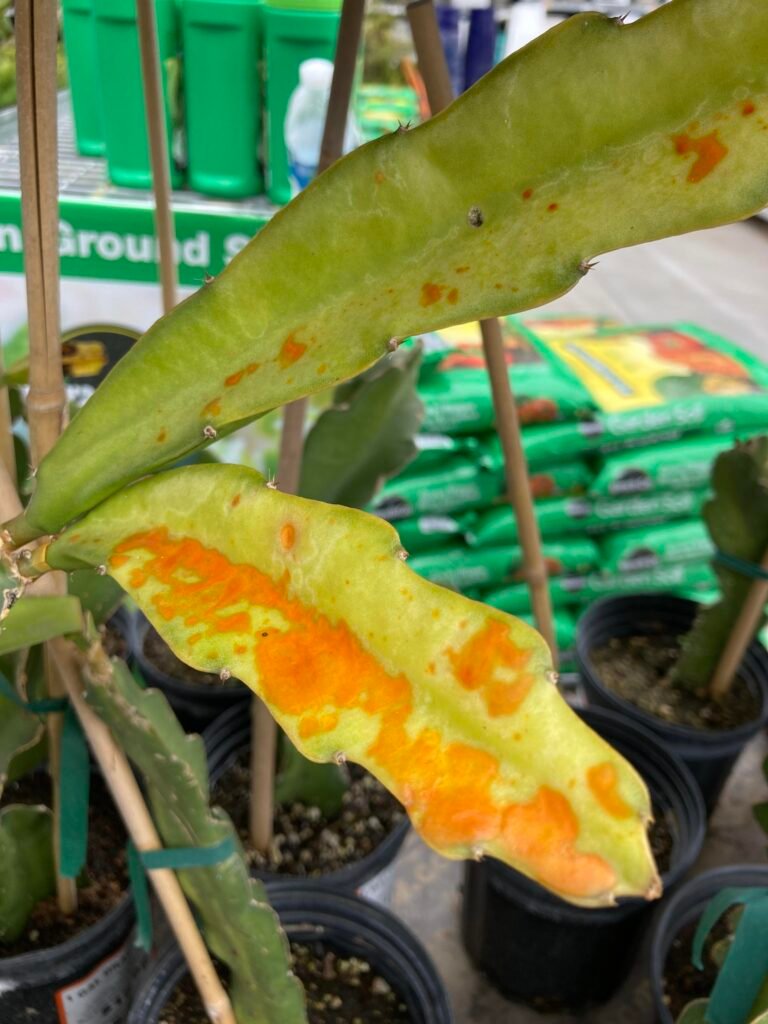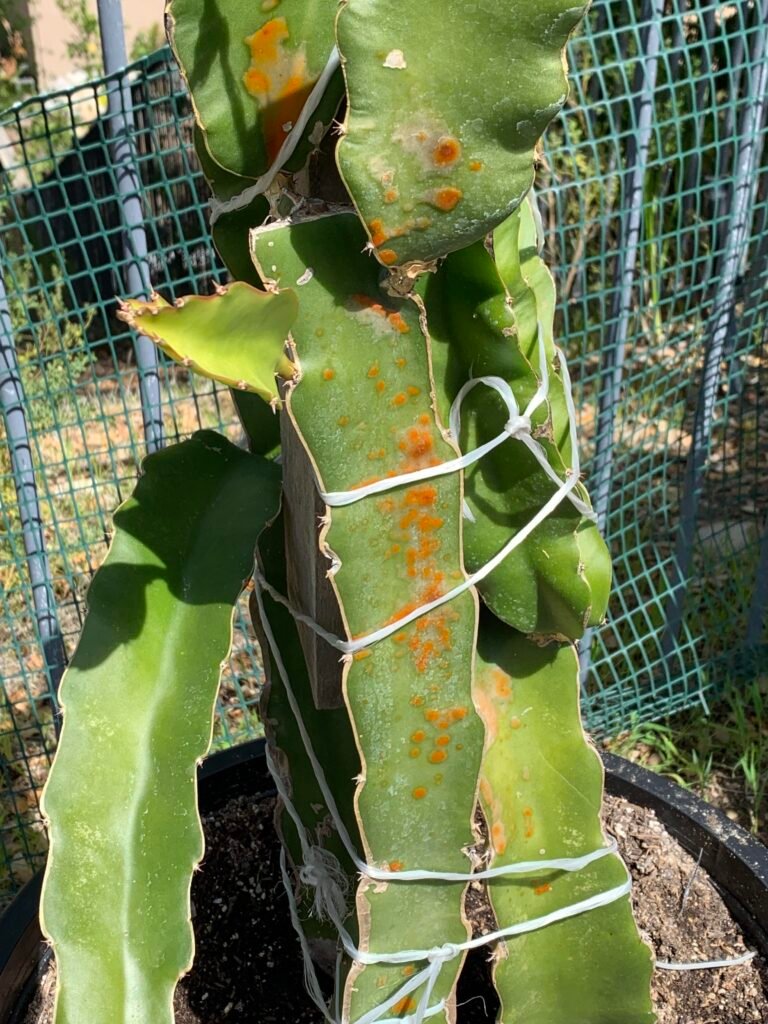Dragon fruit farming is rapidly gaining popularity in India due to its high market value and health benefits. However, like any crop, dragon fruit plants face challenges from pests and diseases, with rust being one of the most common. This blog delves into understanding rust, its root causes, and effective solutions tailored for Indian farmers to ensure a healthy and productive dragon fruit plantation.

Understanding Rust in Dragon Fruit
Rust disease in dragon fruit is caused by fungal pathogens, leading to significant damage if not managed promptly. It starts as small, orange spots on the stems and branches and, if unchecked, progresses to rot. This weakens the plant, affects its growth, and reduces fruit quality and yield.
Symptoms of Rust:
- Orange Spots: Initial signs appear as small, scattered orange spots on the plant’s surface.
- Spread of Infection: These spots enlarge and may spread across stems, eventually leading to cracking and rotting.
- Wilting and Weakening: The plant may wilt as the disease progresses, with reduced photosynthesis and nutrient absorption.
Root Causes of Rust Disease
Understanding the root causes of rust is critical to effective prevention and management:
- Excessive Moisture: Overwatering or poorly drained soil leads to water accumulation around the roots, creating a favorable environment for fungal growth.
- Poor Air Circulation: Densely planted rows hinder airflow, increasing humidity levels and encouraging fungal infections.
- Overhead Irrigation: Sprinkler systems or overhead watering leave foliage wet for extended periods, promoting rust development.

Available Solutions
Solution 1: Chemical and Physical Controls
Hydrogen Peroxide Spray:
- Mix 3% hydrogen peroxide with water in a 1:1 ratio.
- Spray the solution on affected areas to reduce fungal activity.
- Repeat every 7–10 days for consistent results.
Fungicides:
- Use copper fungicides, mancozeb, or metalaxyl-based products certified for dragon fruit.
- Apply at weekly intervals for effective control.
Pruning:
- Remove and destroy infected plant parts to prevent the disease from spreading.
- Ensure tools are sterilized to avoid cross-contamination.
Solution 2: Natural and Organic Approaches
Copper Sulfide Spray:
- Effective in halting the spread of rust.
- Apply during early stages of infection for better outcomes.
Neem Oil Treatment:
- Dissolve neem oil in water (recommended dilution: 5ml per liter of water).
- Spray on the infected areas, focusing on undersides of stems and branches.
Isolation:
- Isolate affected plants to minimize the risk of spreading rust to healthy crops.
Recommended Solution for Indian Farmers
Considering Indian farming conditions, a combination of preventive, natural, and chemical methods works best:
Adopt Preventive Measures:
- Optimize Watering: Avoid overwatering and overhead irrigation. Drip irrigation systems are highly effective.
- Improve Soil Drainage: Incorporate organic matter like compost or cocopeat to enhance soil structure and water permeability.
- Enhance Airflow: Space plants adequately to reduce humidity and improve airflow around them.
Use Natural Remedies:
- Regularly spray neem oil as a preventive measure. Its antifungal properties help deter infections.
- Copper sulfide applications should be part of routine plant care.
Monitor Regularly:
- Inspect plants weekly for early signs of rust or other diseases.
- Early intervention is crucial to prevent widespread damage.
Integrate Chemical Control:
- When organic methods are insufficient, use certified fungicides responsibly. Always follow recommended dosages to avoid overuse and environmental harm.
Integrated Disease Management (IDM)
To achieve long-term success, Indian farmers should adopt Integrated Disease Management (IDM), which combines cultural, biological, and chemical practices:
Cultural Practices:
- Rotate crops to disrupt fungal life cycles.
- Practice intercropping with pest-repellent plants.
Biological Control:
- Promote beneficial microbes in the soil that suppress fungal growth.
- Use bio-fungicides available in agricultural markets.
Chemical Use as a Last Resort:
- Avoid reliance on chemicals to preserve soil health and reduce resistance in pathogens.
Economic and Environmental Benefits of Effective Rust Control
- Improved Yield: Healthy plants result in higher fruit production and better quality, leading to increased profits.
- Reduced Costs: Preventive measures and early interventions minimize expenditures on treatments.
- Sustainability: Organic practices preserve soil health and protect local ecosystems, ensuring long-term viability of the farm.
Challenges for Indian Farmers
Despite its benefits, controlling rust in dragon fruit plantations has its challenges:
- Awareness Gaps: Many farmers lack access to knowledge about disease identification and management techniques.
- Cost of Solutions: Organic and chemical inputs may be expensive or unavailable in remote areas.
- Climatic Variations: Unpredictable weather, such as heavy rainfall, exacerbates rust problems, particularly in tropical regions.
Role of Technology and Support
- Farmer Training: Workshops and field demonstrations by agricultural experts can empower farmers with practical knowledge.
- Mobile Apps: Apps designed for Indian farmers can help identify rust symptoms and recommend timely solutions.
- Government Assistance: Subsidies and incentives for organic inputs and drip irrigation systems can make these solutions more accessible.
Conclusion
Rust pest in dragon fruit plants can cause significant damage if not addressed promptly. By understanding the root causes and adopting a combination of preventive and curative measures, Indian farmers can effectively combat this problem. Emphasizing sustainable farming practices, such as optimizing irrigation and using organic treatments like neem oil, not only ensures plant health but also contributes to environmental conservation.
With proper education, timely intervention, and support from agricultural bodies, farmers can overcome the challenges posed by rust disease, paving the way for thriving dragon fruit cultivation in India.

సర్ అందరి కి ఇంగ్లీష్ పరిజ్ఞానం ఉండదు. దయచేసి గమించగలరు.
నమస్కారం అండి, తప్పనిసరిగా తెలుగులో చేస్తాము, కొంచం సమయం పడుతుంది
సర్ ఎల్లో వైరస్ ఎలా కంట్రోల్ చేయాలి. కొద్దిగా తొందరగా చెప్పగలరు.